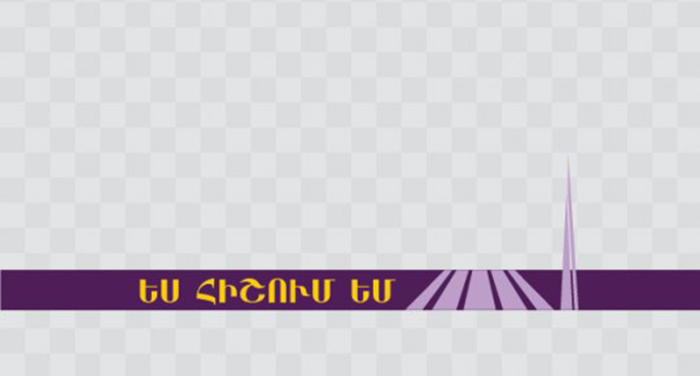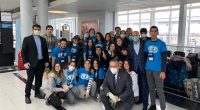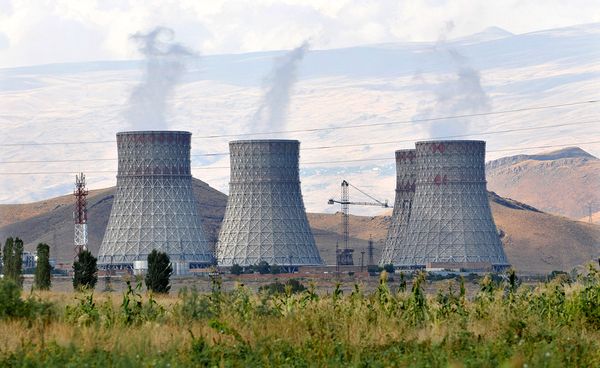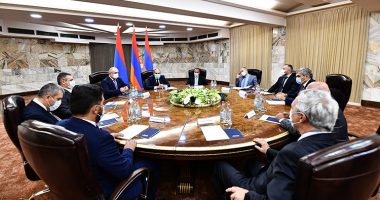YEREVAN — April 24th, the day of remembrance of the martyrs of the Armenian Genocide, is approaching.
The citizens of the Republic of Armenia, the entire Armenian people will be commemorating the 105th anniversary of the Armenian Genocide. This commemoration will be joined by friends of the Armenian people in all corners of the world.
The Armenian Genocide has long gone beyond ethnic memory that is – only being a crime against the Armenian people, of being a mere Armenian tragedy; it is a universal tragedy, one of the greatest crimes against humanity. It is an evil, the international recognition and condemnation of which, as well as the issue of the elimination of the consequences, are to be found within the realm of the struggle for justice.
A century has passed since this crime against humanity and civilization, but its consequences are still being felt. Armenian people remember their grandparents, martyrs of the Armenian Genocide. They remember the heroes of dozens of self-defense battles; those who resisted and tried to defend the right to live; the survivors who became the basis not only of the Armenian Diaspora, but also of almost half of the current population of the Republic of Armenia. They remember the churches and monasteries created during the one thousand seven hundred years of Christianity, which have now become ownerless and ruined; towns and villages, districts and homes; stories told by grandparents about trees and taste of fruit; dances and songs and the sweetness of dialects which are almost forgotten. They remember the brilliant representatives of the Armenian intelligentsia: writers and doctors, journalists and artists, architects and painters, as well as the skilled craftsmen, merchants and cultivators. They also remember those who saved orphans, missionaries, great humanitarian and benefactors. They remember all this with pride and great fondness.
A century has passed since the Genocide, a very long time. Times have changed. Currently, the young Republic of Armenia is thirty years old. The time has come to redefine and reconsider some realities. During the brutal years of the Genocide, Armenians fought, not only with weapons, but also with their spirit. Thousands and thousands remained faithful to their religion and language, their relatives and friends; even if they were forced to change their lives, they returned to their roots at the very first opportunity. Thousands simply did not have the opportunity to do so, but the spirit and memory of Armenianness has lived within them throughout their whole lives. People have striven, fought and become heroes not only on the battlefield, but also in the daily struggle for survival. Parents saved their children, young ones saved adults, neighbour saved neighbour and individuals saved strangers. They shared pieces of bread in the desert or in an orphanage. During the Genocide there were exceptional examples of family solidarity and mutual assistance, of reaching out to each other in difficult moments which were worthy of being subjects of novels and poems.
We therefore must continue to properly value the manifestations of moral and dignified behaviour, and remember, with respect and pride, the martyrs, those who resisted and the survivors.
Regardless of the epidemic situation in the country on April 24, or whether the restrictions on the free movement of people will be maintained on that day due to health and safety concerns, we call on everyone to remember and pay tribute to the memory of the martyrs and survivors of the Genocide using the opportunities provided by the Internet.
To this end, the Armenian Genocide Museum-Institute appeals to the citizens of Armenia, all compatriots and friends of the Armenian people, to replace their photos of users on their Facebook page on April 24 with photos of their relatives, be they victims or survivors, with an special frame created for this purpose. In the case of photographs not being available, insert their names and surnames and share a short story about them in your page. If there are no victims or surviving relatives, post photos of Western Armenian intellectuals, public and political figures, fedayees, ordinary soldiers and military commanders who were victims or survivors of the Genocide. You may insert also photos of the treasures of the cultural heritage of Western Armenia and share the images available to you. Add just one simple caption:










